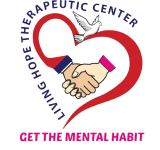Motivational counseling, also known as Motivational Interviewing (MI), is another effective treatment option we use at Living Hope Therapeutic Center to address the problem of addiction addiction.
Here’s an overview of how motivational counseling can be used in the context of addiction treatment:
1- Enhancing Intrinsic Motivation:
Motivational counseling focuses on helping individuals explore and strengthen their own internal motivation to change their addictive behaviors.
It recognizes that lasting change comes from within, rather than being imposed externally.
2- Resolving Ambivalence:
Addiction often involves a state of ambivalence, where individuals may simultaneously desire change and resist it.
Motivational counseling helps individuals explore and resolve this ambivalence by eliciting and reinforcing their own reasons for change.
3- Collaborative Approach:
Motivational counseling is a collaborative process, where the counselor and the individual work together to identify goals, explore barriers, and develop a personalized plan for change.
This approach avoids confrontation and instead empowers the individual to take an active role in their recovery.
4- Tailored Interventions:
Motivational counseling is adaptable and can be tailored to the individual’s stage of change, readiness for change, and unique circumstances.
It recognizes that individuals may be at different stages of the change process and adjusts the interventions accordingly.
5- Enhancing Self-Efficacy:
Motivational counseling aims to increase the individual’s confidence and belief in their ability to change (self-efficacy).
By highlighting past successes and identifying personal strengths, we help these individuals struggling with addictions develop a sense of empowerment and optimism about their recovery.
Motivational counseling is particularly valuable in the early stages of treatment, as it can help individuals overcome resistance to change and increase their engagement and commitment to the recovery process. By fostering intrinsic motivation and empowering individuals to take an active role in their recovery, motivational counseling can lead to more sustainable and successful outcomes.





